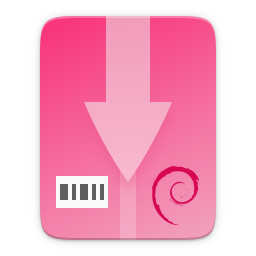
deb-get
apt-get functionality for .debs published in 3rd party repositories or via direct download. It works on Ubuntu and derivative distributions.
Made with 💝 for ![]()
Introduction
deb-get makes is easy to install and update .debs published in 3rd party
apt repositories or made available via direct download on websites or GitHub
release pages.
Install
Use deb-get to install deb-get
curl -sL https://raw.githubusercontent.com/wimpysworld/deb-get/main/deb-get | sudo -E bash -s install deb-getAlternatively, you can download the .deb of deb-get from the releases page
and install it manually.
Usage
Here's an example of how to install Google Chrome.
sudo deb-get install google-chrome-stableYou can see what applications are supported by using sudo deb-get list or you
can search the available applications with sudo deb-get search <app>
You can upgrade packages installed using deb-get by running
sudo deb-get upgrade.
deb-get {update | upgrade | show pkg | install pkg | reinstall pkg | remove pkg
| purge pkg | search pkg | cache | clean | list | prettylist | help | version}
deb-get provides a high-level commandline interface for the package management
system to easily install and update packages published in 3rd party apt
repositories or via direct download.
update
update is used to resynchronize the package index files from their sources.
upgrade
upgrade is used to install the newest versions of all packages currently installed on the system.
install
install is followed by one package desired for installation or upgrading.
reinstall
reinstall is followed by one package desired for reinstallation.
remove
remove is identical to install except that packages are removed instead of installed.
purge
purge is identical to remove except that packages are removed and purged (any configuration files are deleted too).
clean
clean clears out the local repository (/var/cache/deb-get) of retrieved package files.
search
search for the given regex(7) term(s) from the list of available packages supported by deb-get and display matches.
show
show information about the given package including its install source and update mechanism.
list
list the packages available via deb-get.
prettylist
markdown formatted list the packages available via deb-get. Use this to update README.md
cache
list the contents of the deb-get cache (/var/cache/deb-get)
Why?
3rd party apt repositories exist. They are not going away.
Some application vendors and projects express their support for Debian/Ubuntu
by publishing .debs of their software as direct downloads or via
their own apt repositories. deb-get makes it easy to find, install and update
.debs published in this way.
- Perhaps you want to use software that is not (yet) officially packaged for Debian/Ubuntu.
- Perhaps you want to use software that is fast moving and newer versions are available from the vendor/project.
- Perhaps you want to use some non-free software that Debian/Ubuntu cannot distribute due to licensing restrictions.
deb-get tries to remedy this by providing a curated index of software
available for Ubuntu that is published by the project or vendor. deb-get is
inspired by Software Boutique, a graphical application I co-authored that does
much the same thing and has been included in Ubuntu MATE
since 2015.
Supported Software
The software below can be installed, updated and removed using deb-get.
sudo deb-get install <packagename>sudo deb-get updatesudo deb-get upgradesudo deb-get remove <packagename>sudo deb-get purge <packagename>
![]() 1Password (
1Password (1password)
![]() AntiMicroX (
AntiMicroX (antimicrox)
![]() Atom (
Atom (atom)
![]() Etcher (
Etcher (balena-etcher-electron)
![]() bat (
bat (bat)
![]() BeerSmith (
BeerSmith (beersmith3)
![]() Bitwarden (
Bitwarden (bitwarden)
![]() Brave (
Brave (brave-browser)
![]() Visual Studio Code (
Visual Studio Code (code)
![]() VSCodium (
VSCodium (codium)
![]() deb-get (
deb-get (deb-get)
![]() Discord (
Discord (discord)
![]() Docker Engine (
Docker Engine (docker-ce)
![]() Docker Desktop (
Docker Desktop (docker-desktop)
![]() Dropbox (
Dropbox (dropbox)
![]() duf (
duf (duf)
![]() Element (
Element (element-desktop)
![]() Enpass (
Enpass (enpass)
![]() Exodus (
Exodus (exodus)
![]() fd (
fd (fd)
![]() Figma Linux (
Figma Linux (figma-linux)
![]() Firefox ESR (
Firefox ESR (firefox-esr)
![]() Franz (
Franz (franz)
![]() git-delta (
git-delta (git-delta)
![]() GitHub Desktop (
GitHub Desktop (github-desktop)
![]() GitKraken (
GitKraken (gitkraken)
![]() Gitter (
Gitter (gitter)
![]() Google Chrome (
Google Chrome (google-chrome-stable)
![]() Google Earth Pro (
Google Earth Pro (google-earth-pro-stable)
![]() Grype (
Grype (grype)
![]() Heroic Games Launcher (
Heroic Games Launcher (heroic)
![]() Insomnia (
Insomnia (insomnia)
![]() Insync (
Insync (insync)
![]() IRCCloud Desktop (
IRCCloud Desktop (irccloud-desktop)
![]() JabRef (
JabRef (jabref)
![]() Jami (
Jami (jami)
![]() Jellyfin (
Jellyfin (jellyfin)
![]() Keybase (
Keybase (keybase)
![]() KeyPassXC (
KeyPassXC (keypassxc)
![]() LSDeluxe (
LSDeluxe (lsd)
![]() Ludo (
Ludo (ludo)
![]() Lutris (
Lutris (lutris)
![]() Mailspring (
Mailspring (mailspring)
![]() Mattermost Desktop (
Mattermost Desktop (mattermost-desktop)
![]() micro (
micro (micro)
![]() Microsoft Edge (
Microsoft Edge (microsoft-edge-stable)
![]() Nextcloud Desktop (
Nextcloud Desktop (nextcloud-desktop)
![]() Obsidian (
Obsidian (obsidian)
![]() ocenaudio (
ocenaudio (ocenaudio)
![]() ONLYOFFICE Desktop Editors (
ONLYOFFICE Desktop Editors (onlyoffice-desktopeditors)
![]() Opera (
Opera (opera-stable)
![]() Pandoc (
Pandoc (pandoc)
![]() Plex (
Plex (plexmediaserver)
![]() PowerShell (
PowerShell (powershell)
![]() Quickemu (
Quickemu (quickemu)
![]() Quickgui (
Quickgui (quickgui)
![]() Rambox (
Rambox (rambox)
![]() Rclone (
Rclone (rclone)
![]() Raspberry Pi Imager (
Raspberry Pi Imager (rpi-imager)
![]() RStudio (
RStudio (rstudio)
![]() Signal (
Signal (signal-desktop)
![]() Simplenote (
Simplenote (simplenote)
![]() Skype (
Skype (skypeforlinux)
![]() Slack (
Slack (slack-desktop)
![]() Spotify (
Spotify (spotify-client)
![]() Sublime Merge (
Sublime Merge (sublime-merge)
![]() Sublime Text (
Sublime Text (sublime-text)
![]() Syft (
Syft (syft)
![]() Syncthing (
Syncthing (syncthing)
![]() Microsoft Teams (
Microsoft Teams (teams)
![]() TeamViewer (
TeamViewer (teamviewer)
![]() Tixati (
Tixati (tixati)
![]() Trivy (
Trivy (trivy)
![]() Ubuntu-Make (
Ubuntu-Make (ubuntu-make)
![]() Vivaldi (
Vivaldi (vivaldi-stable)
![]() Wavebox (
Wavebox (wavebox)
![]() Webex (
Webex (webex)
![]() WeeChat (
WeeChat (weechat)
![]() Wire (
Wire (wire-desktop)
![]() Zenith (
Zenith (zenith)
![]() Zoom (
Zoom (zoom)
Legend
The icons above denote how deb-get installs/updates the packages.